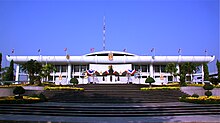Senate of Thailand
|
Senate วุฒิสภา Wutthisapha |
|
|---|---|
 |
|
| Type | |
| Type | |
| Structure | |
| Seats | 150 Members |
|
Political groups
|
76 elected and 74 appointed the Academic Sector, the Public Sector, the Private Sector, the Professional Sector and Others |
| Elections | |
|
Last election
|
2 March 2008 |
| Meeting place | |
 |
|
| Parliament House of Thailand | |
| Website | |
| www.senate.go.th | |
The Senate (Thai: วุฒิสภา; rtgs: Wutthisapha; formerly known as Phruetthasapha or "พฤฒสภา") was the upper house of the National Assembly of Thailand, (Thailand's legislative branch). In accordance with the 2007 Constitution of Thailand, the Senate was a non-partisan legislative chamber, composed of 150 members. Seventy-six Senators were directly elected from the 76 Provinces of Thailand and Bangkok, while the other 74 were appointed from various sectors by the Senate Selection Committee. The Senate operated under fixed terms of six years.
Both the Senate and the House of Representatives were abolished as a result of the 2014 Thai coup d'état. These were replaced with the unicameral National Legislative Assembly, a body of 250 members, selected by the National Council for Peace and Order.
The idea of bicameralism first permeated Thai politics with the Constitution of 1946, when the government of Pridi Panomyong introduced a senate modelled on the British House of Lords. For the first time, an upper house came into existence in Thailand. The Senate was to be fully elected, however, the elections would be indirect, as the House of Representatives would elect the senators, for six-year terms. The 1946 Constitution was soon abrogated in a military coup. Subsequent constitutions saw only occasional bicameralism, and when it did exist, the Senate was always filled with appointees from the military and the elite. The 1997 Constitution saw a return to a fully elected Senate. That constitution was abrogated after the 2006 coup, and replaced with one calling for a half-elected/half-appointed Senate.
...
Wikipedia
